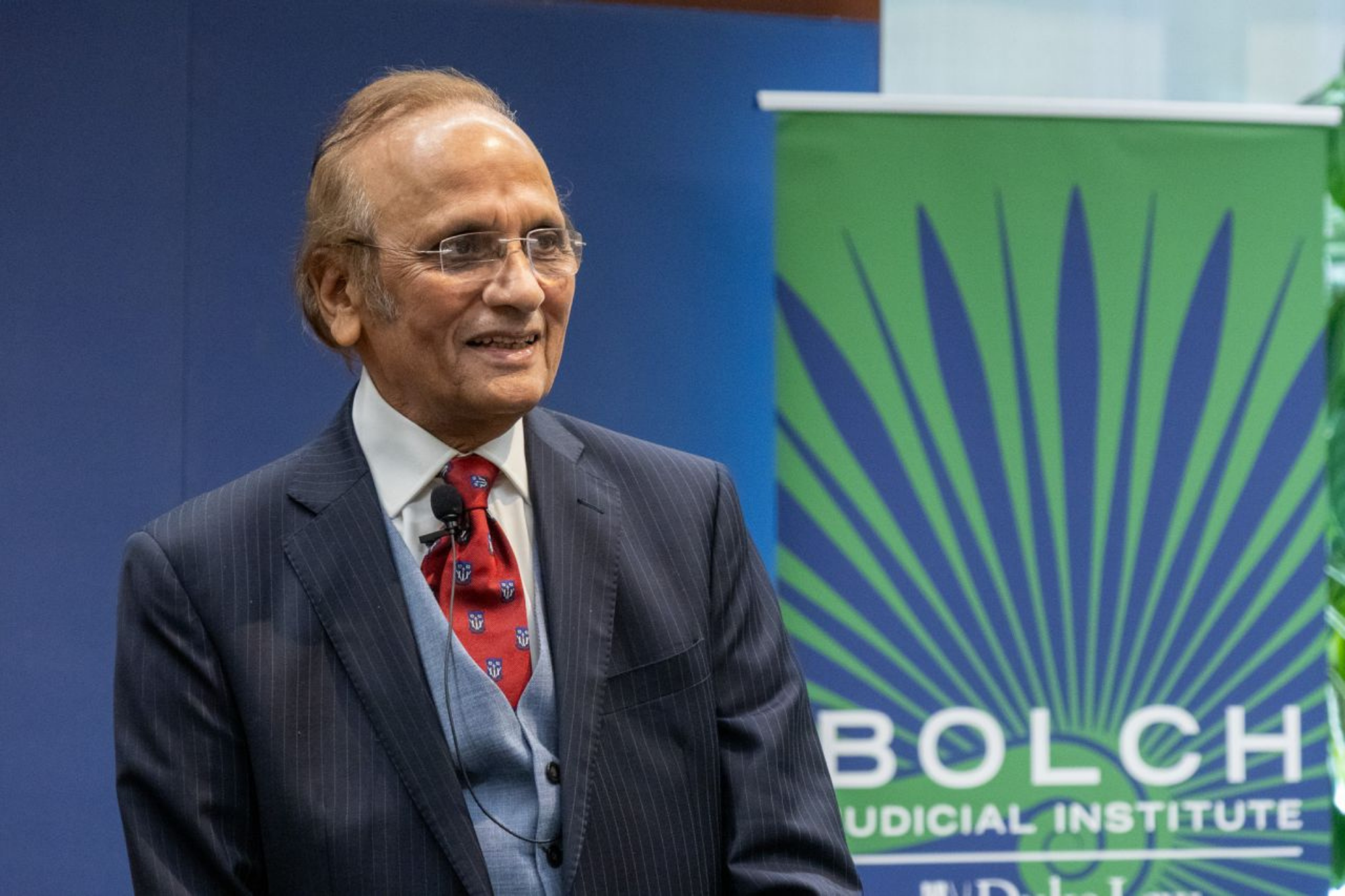
As part of celebrations at Duke University in April honoring Justice Tassaduq Hussain Jillani, the 2025 recipient of the Bolch Prize for the Rule of Law, the Bolch Judicial Institute hosted a conversation with the justice attended by Duke Law faculty, students, and staff about his life and judicial career.
“Justice Jillani is exactly the sort of person we had in mind when this prize was created,” said Kerry Abrams, James B. Duke and Benjamin N. Duke Dean of Duke Law School and Distinguished Professor of Law, in her introductory remarks. “His tenure as a judge was defined by a steadfast commitment to the rule of law and his nation’s constitution — even when that commitment required him to stand up to a military dictator or defy public opinion and social traditions.”
Following opening remarks, the discussion was led by Judge Paul W. Grimm (ret.), director of the Institute, and covered Justice Jillani’s judicial philosophy, landmark rulings on minority rights and religious freedom, and refusal to legitimize an unconstitutional regime during Pakistan’s 2007 state of emergency. But first, Justice Jillani described his career trajectory in law and his ascent to the bench.
Justice Jillani began his legal career as a lawyer in the district’s courts of Multan in the high court of Lahore, and he said that what inspired him to enter the practice of law was a sense of “idealism to do something in public life.”
He then served as assistant advocate general and then advocate general of Punjab before being elevated in August of 1994 to serve as a judge in the high court of Lahore. In 2004, he was named as a justice of the Supreme Court of Pakistan, and he was chief justice for the last year of his tenure on the Supreme Court from 2013 to 2014.
The focus of the conversation then shifted to Justice Jillani’s courageous stance against military dictator General Musharraf in 2007. Justice Jillani was among a group of senior judges who refused to take a new oath of loyalty to Musharraf and were relieved of their judicial duties. This ignited the Lawyers’ Movement, in which lawyers throughout Pakistan protested the Musharraf regime’s assault on judicial independence.
“He imposed a state of emergency, a special oath of loyalty. We were shocked. How could he do that? And I decided — there and then — that there had to be an end to it,” Justice Jillani said. “The good thing was that a great majority of judges were of the same view. So that moral stand had a very positive effect on the bench, on the Bar, and on the public.”
When asked about the personal risk involved, he acknowledged that his family faced significant challenges, including the potential loss of their government housing. “It was my family — my sons and my daughter, my wife — who stood up and said, ‘No way. We are with you, house or no house.’”
The resulting protests by lawyers across Pakistan, which were supported by bar associations worldwide, contributed to Musharraf’s resignation. Justice Jillani was reinstated thereafter.
Justice Jillani’s groundbreaking work on religious freedom and plurality was a highlight of the discussion. As Chief Justice, he issued a landmark ruling on minority rights after taking suo motu notice of violence against religious minorities, including a suicide bombing at a Peshawar church that killed 81 Christians.
“I was a very sensitive young man, and I found that we were not treating the minorities fairly,” Justice Jillani said. “I always looked for a moment or a case in which I could announce my opinions.”
His judgment included seven directives, including the creation of a special force to protect places of worship for minorities, the establishment of a National Council for Minorities’ Rights, and the development of curricula promoting pluralistic values. He declared that religious freedom is multidimensional and encompasses “the right to believe, right to propagate, and right to disseminate.”
To facilitate implementation, Justice Jillani established a three-member bench charged with overseeing the judgment’s execution; still today, this mechanism provides minorities with an accessible platform for justice.
Justice Jillani also described his judicial philosophy, emphasizing three principles: judges must decide matters according to constitutional values; the judiciary has a pedagogical role to educate citizens; and judges must sometimes serve as catalysts for social change.
“Unless the public is educated, unless the public is conscious, unless the public is aware of the constitutional values, you cannot have a functional democracy and you cannot have a rule of law,” he said.
The event concluded with questions from those in attendance. A Duke Law student asked about the intended audience for judicial opinions, inquiring whether they should be written for lawyers or the public. Justice Jillani responded that judgments should be accessible to all.
“Opinions and judgment are basically rendered for the public, for their rights, to explain their rights, to explain the issue involved,” he said.
Justice Jillani’s former law clerk, Annum Haider — his “first and only law clerk” who inadvertently became the first clerk to a Chief Justice of Pakistan — provided a poignant end to the discussion as she spoke reverently about working with him. Haider is now Senior Counsel at the New York City Law Department.
“He is a master of interpreting the law,” Haider said. “He stands by his morals and his beliefs above everything else. And it is a very difficult task to balance that with the law and with the cultural norms that we have in Pakistan and the religious aspects, and he does that masterfully.”
As the event concluded, Justice Jillani offered a gentle reminder that resonated with the U.S. audience.
“The rule of law, the threat to rule of law is not confined to countries like Pakistan, and America should realize this,” he said. “They should watch out whether the rule of law is under threat today or not.”
The full conversation is available to watch on Duke Law’s YouTube Channel.